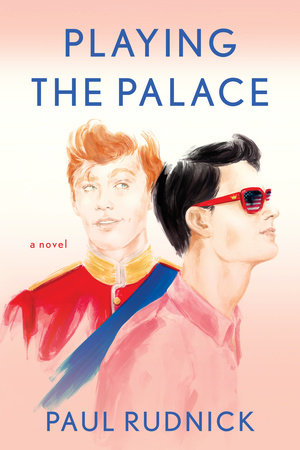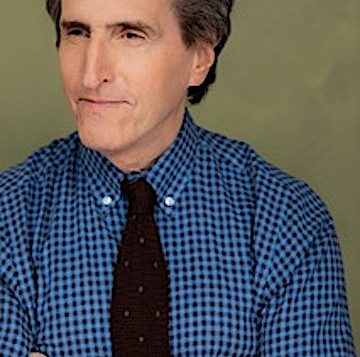 PLAYING THE PALACE
PLAYING THE PALACE
by Paul Rudnick
Berkley. 327 pages, $16.
WHAT HAPPENS when a gay American man and the heir to the British throne meet and fall in love? In Playing the Palace, Paul Rudnick makes full use of his comedic skills—evident in such screenplays as Jeffrey, Sister Act, and In and Out—to bring this improbable romance to life. Rudnick’s plays have been produced both on and off Broadway and around the world, and he’s been called one of the funniest writers for stage and screen in the U.S. His latest work of fiction does not fall short of that praise.
Carter Ogden, a thirty-year-old guy who makes his living as an associate event planner, is reeling from a bad breakup with a narcissistic actor who has left him after a three-year relationship. Carter questions the point of his life and hopes to find some answers when he stops by St. Patrick’s Cathedral (even though he’s Jewish) and falls on his knees in prayer. He prays that God might look favorably upon him as he pleads for a big life, a purpose, and someone to love.
The answer to his prayer comes when he meets Edgar, the Prince of Wales. Edgar is speaking at a press conference and attending a public relations function at the UN, planned by none other than Carter’s event planning company. Prince Edgar is championing the cause of providing clean drinking water to impoverished populations throughout the world. Besides being charitable and altruistic, Edgar is incredibly good-looking and openly gay. Sparks immediately fly between the two men.
After their fateful first meeting, Carter is tracked down by James, Edgar’s faithful manservant, and Edgar and Carter meet for their first dinner date at an exclusive restaurant in New York. Uncomfortable in this posh setting, Carter whisks Edgar away to an IHOP for the Blue Plate Special. There, the barriers of protocol between royalty and commoner begin to break down, and their authentic selves are allowed to be seen.

Prince Edgar takes a certain pleasure in being a role model for the LGBT community, but he’s under pressure to fulfill his role in the monarchy. He feels that royal protocols have restricted his ability to lead his own life, and laments that other publicly gay figures do not view him as “the right kind of gay.” Carter questions his worthiness to be loved by someone like Edgar. Both men have been burned and hurt in their past relationships, which puts them on guard and on edge.
Despite these impediments, they begin a whirlwind romance that is necessarily in full view of the public. Their appearances together become fodder for the press and lead to a few humiliating situations for Carter, some that are hilariously presented. Carter is under intense scrutiny, not only by the press, but also by officials in the Palace. Many of these situations lead to embarrassments for Edgar, such as when Carter and Edgar are at an orphanage and Carter is entertaining the children with a story that has Spiderman cast as a gay superhero, which results in a flurry of controversial headlines in the British press; or when Carter developed a sudden case of food poisoning and ends up vomiting on a live TV show. Carter begins to wonder if all his mistakes and missteps are going to destroy his chances for a life with Edgar.
Rudnick has constructed wonderful supporting characters that enliven the story. For example, there’s Carter’s wide-eyed sister Abby, who can’t get enough of celebrities, and his feisty Aunt Miriam, who’s all of four feet tall and who continually speaks her mind, along with his crazy roommates Adam, a dancer on Broadway, and Louise, who denounces Edgar and the monarchy as contrary to equality and human rights. Then there’s Queen Catherine, Edgar’s grandmother, who can’t seem to remember Carter’s name and calls him a malignant reptile, among other things.
Rudnick’s skill as a writer animates every page, with humor woven through the entire story. It’s a highly implausible tale, needless to say, given what we know about the real royal family. But that’s what makes it such an enjoyable novel. One needs to suspend one’s doubts and go with the fantasy that perhaps the heir to the throne could be gay, that he could fall in love with an American commoner, and even that they could live happily ever after. But Paul Rudnick actually pulls it off. ____________________________________________________






